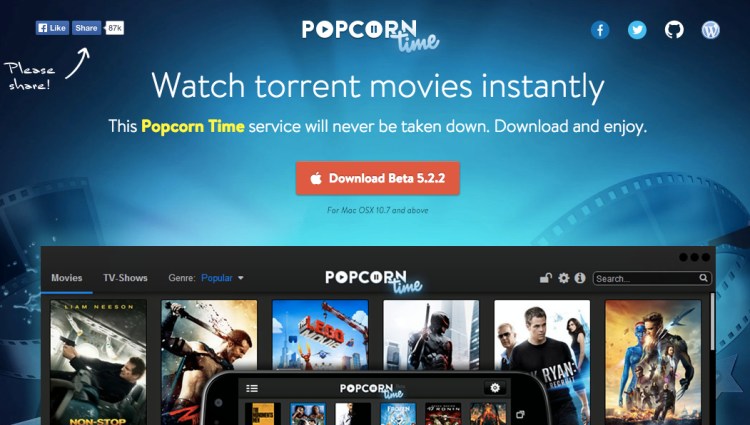Want smarter insights in your inbox? Sign up for our weekly newsletters to get only what matters to enterprise AI, data, and security leaders. Subscribe Now
Be afraid, Hollywood and Netflix. Be very afraid.
A developer involved in the streaming video pirate service, Popcorn Time, claims the application is being downloaded now at the rate of 100,000 times per day. That little nugget comes courtesy of Wired in a broader look at the impact of Popcorn Time since its return last year.
That pace almost matches that of Netflix, which signed up an average 138,000 users per day in the fourth quarter of 2014. While Netflix, which has 57.4 million worldwide users, is still likely far ahead, the fact that Popcorn Time has gotten so close strictly on word of mouth is, well, staggering.
For those not familiar with Popcorn Time, it’s an application that creates a Netflix-like interface for torrents of videos. With typical torrent applications, you have to find and wait to download entire videos before watching. Not only does it clog up your hard drive, it can take a while depending on the number of peers sharing the video and your broadband speeds.
Popcorn Time presents you with a Netflix-like graphical interface that lets you start streaming a movie with just a couple of clicks. And because the content is pirated, it has pretty much an unlimited selection of movies and TV shows, unlike Netflix, which remains hamstrung by whatever deals it can cut with Hollywood studios.
The software was the project of some anonymous developers and was released as an open-source project. Authorities successfully halted it, but then a range of other developers resurrected it. Wired corresponded with one the folks involved in the project.
The creators of Popcorn Time had previously argued that the service was legal because it never actually placed a copy of the content on your computer. Hollywood, of course, begged to differ.
In any case, in the Wired story, the developer says Popcorn is moving toward relying even more on peer-to-peer sharing of content to drive the video streams, rather than using centralized servers. The evolution is designed to, in theory, make it even more difficult for authorities to take down the service, as happened to the Pirate Bay late last year when Swedish authorities raided its offices.
Netflix chief executive Reed Hastings has already said publicly earlier this year that Popcorn Time poses a long-term threat to his company. With downloads of the software apparently accelerating, that may be even more true.
It will be interesting now to see how Hollywood responds. More than a decade ago, when the music industry was freaked out about music piracy, Apple was able come in and offer an alternative in the form of iTunes. Apple correctly predicted that users would be willing to pay for digital downloads if they came in the context of an easy-to-use interface that was also secure from spyware and adware.
Video content creators, while aware of piracy, have not been quite as concerned because downloading torrents has remained a bit too complex and inconvenient for typical users. If Popcorn Time simplifies the process, and dramatically increases piracy, then Hollywood may find itself with far less leverage if revenues take a hit.
Netflix could argue it’s the white knight here, allowing content creators to at least get paid if they make more of their shows and movies available, and at a faster pace and a lower price.
But even if Hollywood decides that Netflix is its new best friend and greatest hope to get paid for content and stem piracy, it’s not clear that such an unlikely alliance is going to slow Popcorn Time’s momentum.
Source: Wired


